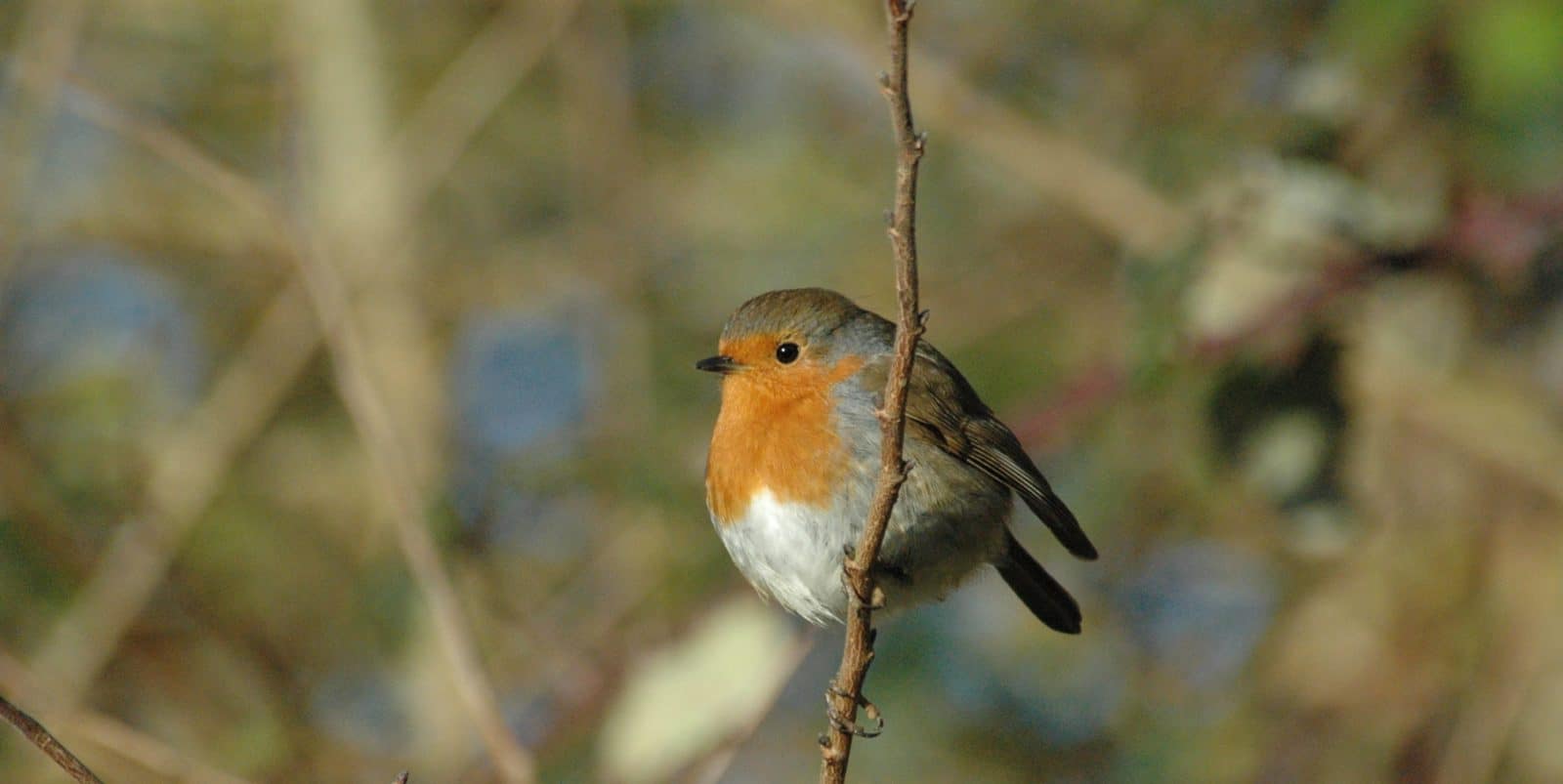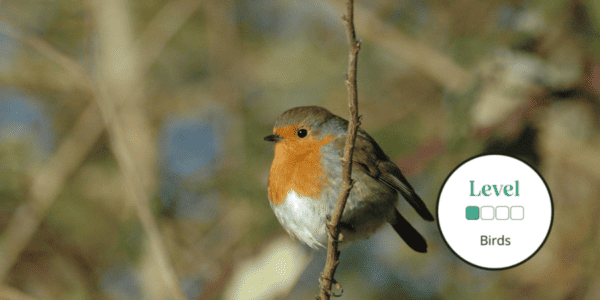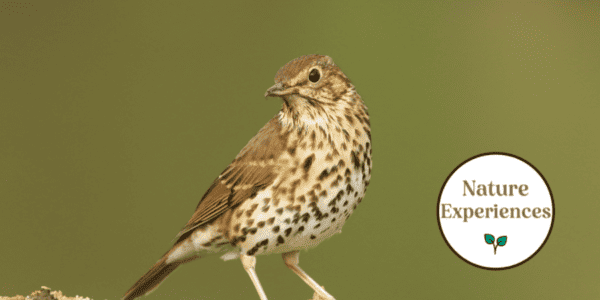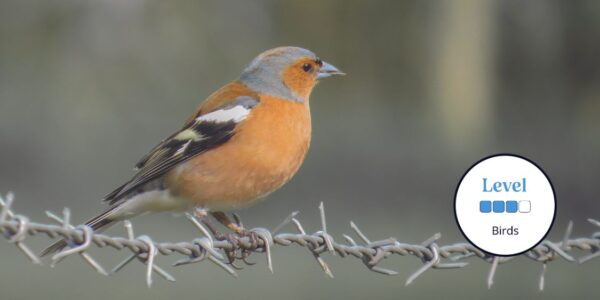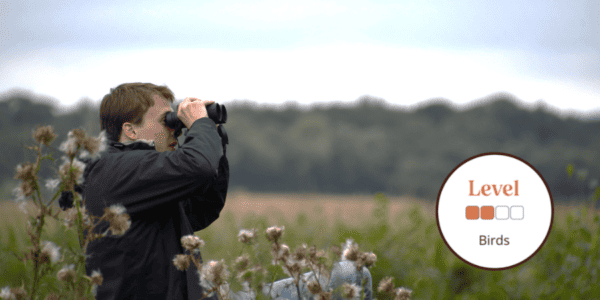Summer is a great time to learn birdsong and identify bird species. The coast, woods and hills around this area are full of sound and breeding activity in summer.
Migration will be in full swing, and you should encounter both resident and summer species. Learn about bird behaviour and start your journey into the wonderful sounds of nature.
This beginner course is the perfect introduction for those with an interest in birds and wanting to learn how to identify a range of birds by sight and sound. During this course, we will visit a range of habitats and hopefully see and hear a range of common species. Most of the time will be spent outdoors observing birds and listening to their songs and calls. North Wales has a range of habitats, including coastal cliffs and bird reserves, Celtic rainforest, coniferous forest and the hills all of which provide excellent locations for seeing some of the area’s special avifauna.
The centre is set in the beautiful, rugged landscape of the Snowdonia National Park, North Wales – with access to secluded wooded valleys, rocky shores, beaches and traditional seaside resorts.
PLEASE NOTE the course fee is for tuition only. There is no accommodation provided with this course. If you would like to book accommodation, lunch and an evening meal at Rhyd-y-Creuau please email [email protected]
*Bookings will close if course capacity is reached
This course is for anyone with an interest in learning more about bird identification in a range of habitats.
Who Should Attend?
Nature enthusiasts, Students, Rangers, Early career consultants and ecologists.
Knowledge Level
Beginner. Level descriptors can be found on the following webpage: Framework and Course Level Descriptors
Prior Knowledge
No specific experience is expected, but it would be helpful to have some understanding of British birds
What will be covered during this course?
-
- Bird identification skills
- How to use a field guide
- Introduction to common bird families
- Differences in bird plumage
- Basic bird description
By the end of the course, you will be able to:
-
- Outline what information is required to distinguish one species from another
- Use basic identification guides with some confidence
- Identify some of the commoner bird species through sight and sound
- Share this knowledge with friends, family, and fellow volunteers
The course gives you the opportunity to immerse yourself in a new subject and acquire novel skills. Our fantastic tutor will combine the use of classroom-led learning and outside learning opportunities to give individuals the skills and confidence to learn more about birds.
-
- See the ‘Example Timetable’ and ‘What’s Included’ sections below for more information about this course
- Upon booking, you will need to provide individual details of all attendees
- Please email [email protected] if you have any questions
Group Bookings Made Easy
If you have a group of 10 or more individuals wanting to complete one of our courses, our team are available to discuss your options – from discounts to private team courses.
-
- Discounted rates
- Privately run courses for your group
- Bespoke courses developed specifically for your needs
Email [email protected] to discuss your options!
If we are unable reach viable numbers for this course, we will inform you of the course cancellation 14 days prior to the course run. We would recommend when purchasing accommodation and/or travel you should take out your own insurance.
Tutor: Anne Brenchley
Anne was born and brought up in Kent and has been a keen birdwatcher from a very early age. She was awarded a Zoology degree and a PhD from Aberdeen University (studying Rooks) and went on to spend most of her working career, until 2011, with Natural England and its predecessors. She has been a Regional Rep for the British Trust for Ornithology since 2000 in Flintshire and Wrexham, organising and taking part in surveys and also helping other volunteers. She is also a fully qualified bird ringer and the main author of the Breeding Birds of North Wales published in 2013. Anne is now an independent ecological/horticultural consultant and lead birdwatching/wildlife walks on a weekly basis.Book with Confidence
We understand the difficulties of making plans in the current situation when guidelines continue to change, and insurance conditions are being tightened. In response, we will continue to offer additional flexibility. Find out more here
Example Timetable
Example Timetable
This timetable is subject to change but should give a clear outline of what to expect
-
- Please arrive in time for the course to start promptly at 10:00 am
- The course will end at 5:00 pm.
Day 1
| 10:00am | Tutor introduction and classroom session covering:
|
| 10:30am | Break and prepare for field session – refreshments not provided |
| 10:45am | Field visit |
| 1:30pm | Lunch – not provided |
| 2:30pm | Continued field time |
| 4:30pm | Return to classroom, summary and final questions |
| 5:00pm | End of course |
Please note - accommodation, refreshments and an evening meal are not included
Day 2
| 10:00am | Recap of day 1 |
| 10:30am | Break and prepare for field session – refreshments not provided |
| 10:45am | Field visit |
| 1:30pm | Lunch – not provided |
| 2:30pm | Continued field time |
| 4:00pm | Return to classroom, summary and final questions |
| 5:00pm | End of course |
We will be walking between 3-4 miles each day on variable terrain. Farmland sites will in general be fairly flat but woodland paths could be narrow and steep in parts. Paths can be muddy after a period of rain.
What's Included
The course has been carefully created by expert tutors and educators to help you build your knowledge and apply it within the field surrounded by like-minded individuals.
The course includes:
- Classroom learning covering the theory of the species
- Field excursions to apply new knowledge
- Expert tuition for which the Field Studies Council is renowned
You can rest assured that the absolute best content from an expert in environmental education will be provided. In choosing a Field Studies Council course, you will be joining thousands of people who learn with us each year.
Before You Attend
What to Bring:
- Notebook and pencil
- Lunch and refreshments
- Sensible footwear and clothing for being outdoors
- Small bag to carry personal items
If you have them:
- Binoculars
- Your own reference book(s)
There will be a member of staff with first aid training and access to a first aid kit on site. If you have special medical or access requirements, please let us know as soon as possible so we can plan the course.
Sorry this course has ended

